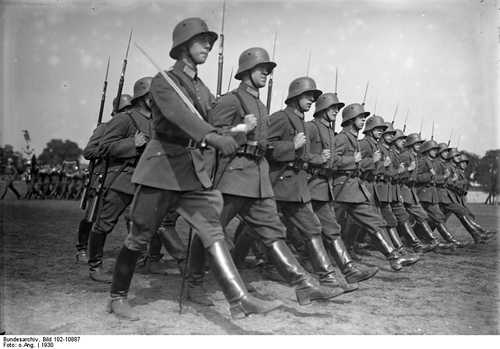
German Forces
Smart body of men - Reichswehr parade, 1930.
Bundesarchiv.
Ultra-smart Reichswehr company, uniformed and equipped more in line with 1918 than with 1938, on parade, 1930. Following the defeat in WW1, the Reichswehr remained the core of instrument of power in the new German Republic, first, in contributing (with the aid of its aligned Freikorps militias) in securing Germany's reduced borders against foreign (particularly Polish intrusions) and, perhaps more importantly, in putting down Left-wing and (non-aligned) Right-wing radical movements within Germany. By 1930, things had settled down considerably on the military/paramilitary front, notwithstanding the presence of several numerically strong Left and Right-wing paramilitary movements in Germany (including the rapidly-growing Nazi SA, the "Red" militias and even street-fighting movements associated with "constitutionalist" political parties). However, the Reichswehr remained the ultimate key to control of the fractured Weimar Republic. This was because, for all the proliferation of paramilitary hit-squads and street-brawling "armies", the Reichswehr maintained its structural integrity and discipline, this notwithstanding the restriction of its numbers to 100,000 under the terms of the Versailles Treaties. An important contribution to this quiet dominance was made by the early generals, who maintained a disproportionately high proportion of (hand-picked) officers who had distinguished themselves in WW1. There was also the success of these generals in maintaining a semi-covert version of the old German Imperial General Staff in the form of the "Truppenampt" (Army Office), which worked incessantly (under cover, more or less) to maintain the level of General Staff training and to prepare, as far as possible, for a future expansion of the Army beyond Versailles limits. One would have to suspect that this situation was allowed to develop in part because the western Allies - or at least the Americans and the British - to turn a blind eye to the activities of the Truppenampt. This would not have been too surprising, in view of the perception of a rising threat from the newly-minted Soviet Union during the 1920s. Another reason for this "blindness" arose from the chaos that almost engulfed Germany in 1918-'80, which made it clear that some disciplined military force - however small - was needed to keep the lid on potentially disruptive German social and political developments. Whatever the reason - it all meant that when Hitler came along, it was the Army, not the SA, that he had to come to terms with before he could subvert the Republic. Certainly not the SA ... Best regards, JR.
3367 Views
12/7/2015
